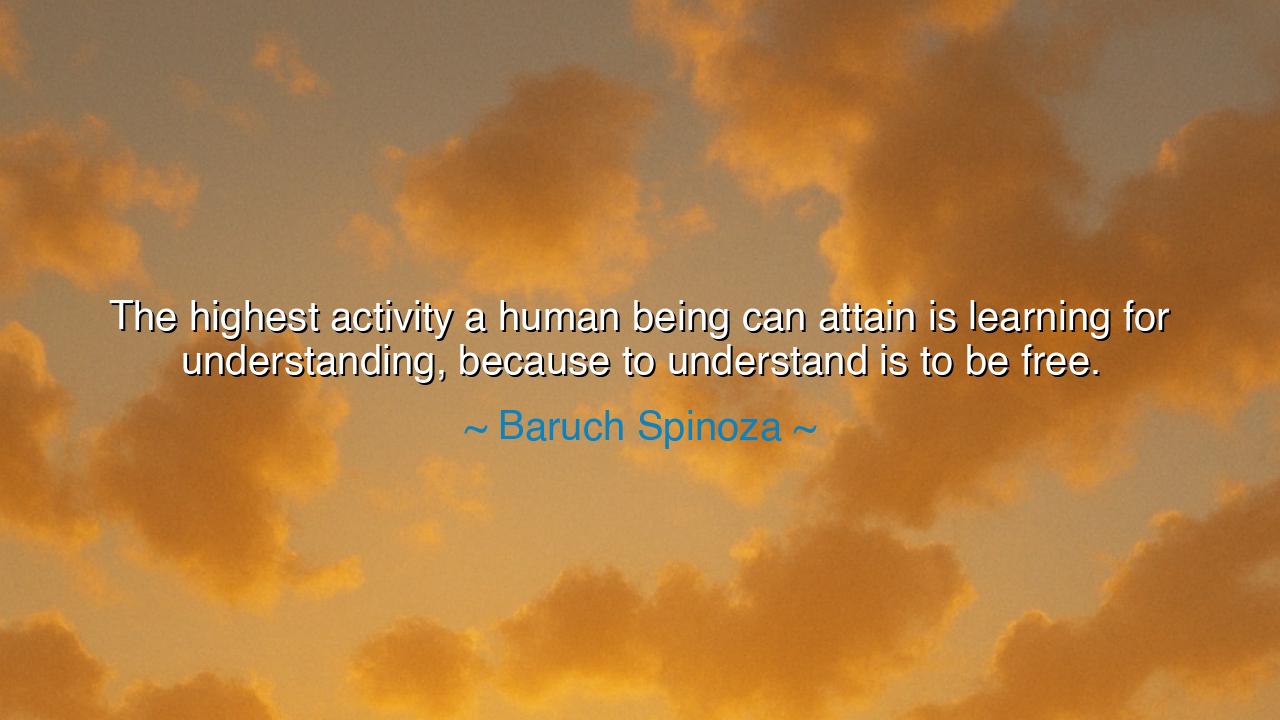
The highest activity a human being can attain is learning for
The highest activity a human being can attain is learning for understanding, because to understand is to be free.






“The highest activity a human being can attain is learning for understanding, because to understand is to be free.” — these words, spoken by Baruch Spinoza, one of the great philosophers of the seventeenth century, shine like a lantern in the long corridor of human thought. Spinoza, a man of both reason and reverence, sought to uncover the divine logic that binds all things. In this quote, he does not speak merely of learning facts or acquiring skill, but of the sacred pursuit of understanding — that deep comprehension which liberates the mind from fear, confusion, and ignorance. For to understand, he says, is not merely to know — it is to be free.
Spinoza lived in a time when thought itself was dangerous. Exiled from his own religious community for questioning dogma, he chose truth over comfort, inquiry over obedience. His life became a living testament to this belief: that true freedom begins in the mind. To “learn for understanding” is to rise above superstition, prejudice, and blind submission — to see the world as it truly is, rather than as others command you to see it. In a world that sought to silence him, Spinoza found liberty in comprehension. Knowledge, for him, was not the servant of pride, but the pathway to peace.
When he says that this is the highest activity, he means that no labor of the body or achievement of wealth can equal the work of the spirit that seeks to understand. The craftsman may shape wood, the warrior may conquer lands, but the thinker who seeks to understand shapes the very foundation of his being. For when one understands, one no longer fears. The storms of fortune may rage, but the enlightened mind stands calm, knowing the causes and accepting the flow of nature. To understand is to cease being a slave to circumstance — it is to align oneself with truth, and thereby attain freedom of the soul.
History gives us countless examples of this principle in action. Consider Galileo Galilei, who looked through his telescope and saw what others refused to see — that the Earth moves around the Sun. His understanding brought upon him persecution and condemnation, yet in his mind he was freer than his judges. They were bound by ignorance and fear, but Galileo, even imprisoned, possessed the liberty of comprehension. The walls around him could not contain his spirit, for he had seen with his own eyes the vastness of the universe. He had learned for understanding, and in that understanding, he had found a freedom that no authority could steal.
Spinoza’s wisdom also speaks to the modern heart, which is often enslaved not by rulers or priests, but by noise, distraction, and misinformation. The chains of ignorance have changed their shape, but not their nature. To this generation, his call still resounds: seek understanding, not just information. Many learn for advantage, for praise, for wealth — yet their minds remain restless, their spirits unfree. But the one who learns to understand — to see things clearly, to discern cause and consequence, to know both the world and oneself — that one walks in peace. For clarity of mind is the truest liberty.
To understand is also to forgive. When we comprehend the reasons behind human weakness, the patterns of suffering, the roots of hatred, our hearts grow gentle. Spinoza knew that understanding dissolves anger as sunlight melts frost. The more we understand others, the freer we become from resentment. The more we understand life, the freer we become from fear. Thus, learning for understanding is not cold intellect — it is the warm fire of compassion kindled by wisdom. It is both knowledge and mercy intertwined.
Therefore, my children, let this teaching dwell in your hearts: learn not to impress, but to understand. Ask not merely “what,” but “why.” Seek not only to master the world, but to comprehend its essence. Study the laws of nature, the mysteries of the human heart, and the truths of your own soul. And when confusion arises, do not despair — for every question bravely faced is a step toward freedom.
For the one who understands walks unshaken through chaos, unbound by ignorance, untouched by hatred. To understand is to see the divine order within all things, to recognize that every being, every moment, every challenge, has its place in the great tapestry of existence. And when you reach even a glimpse of that understanding — when your mind and heart align with truth — you will know what Spinoza meant: that the highest act of all is to learn for understanding, for in that moment, you will be truly, eternally free.






AAdministratorAdministrator
Welcome, honored guests. Please leave a comment, we will respond soon